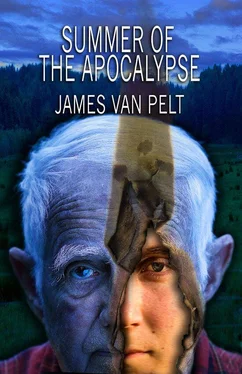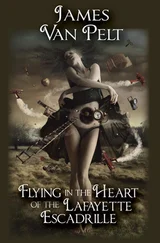“’Scuse me?” said Eric. His stomach bulged pleasantly from dinner, a savory squirrel stew, and he felt tired and lazy. The night was so warm he thought he might just go to sleep as he was, without unrolling the bag, like Dodge and Rabbit.
Teach put his hand out to Eric, motioning him to stay still. “A rare privilege. Earth dancers.” He pointed beyond the fire behind Eric. The other men looked past him, holding their dinner plates still, as if frozen.
“Move slowly,” said Teach.
Eric dropped a shoulder and turned. At first, blinded by the firelight, he saw nothing, then white shapes resolved themselves from the blackness. Men. They were clearly men, naked and painted white, dancing at the edge of the clearing.
Teach said, “Have you seen them before?”
The dancers, perhaps fifteen or so of them, bent low, brushing their hands against the ground, then jumped for the stars, throwing their hands wide open. Other than the crackle of flame, Eric heard nothing, but the dancers bounced in rhythm, all of them low, then they burst up, as if on cue, hanging in their outstretched poses, a mountain ballet.
“No,” he whispered. He remembered the white figures in Phil’s videos, the ones driving him crazy with fear. “Maybe,” he added. “Who are they?”
One of them broke toward the fire, running, hands low and open, Forty feet away, he put his arms out like wings and veered away, rising from his crouch as if he could fly. One after another, others followed his lead, some coming as close as a dozen feet before curving back to the dark.
“First men,” said Teach.
When they ran particularly close, Eric could see that the white was a powder, like chalk, some places smeared thickly enough to crack at the elbows and knees, and almost worn off in other places. Their hair was thick with it.
“My boys think they’re spirits, or ghosts. Their momma’s scared them with stories of Earth Dancers, and now they believe them to be supernatural.”
Someone hissed, “We’re not babies anymore, Teach.” But the voice sounded awestruck. Teach continued, “Feral men. I think they’re the children of the children of the children. No, don’t speak to them. They’ll run. When the plague moved on, some of the survivors were little kids, four, five, six years old. They must have been horribly afraid, their parents dead, the dogs going wild, so they hid in the city.”
Eric hadn’t thought of that before. The plague killed ninety-nine percent. In the weeks after, when only the survivors were left, one out of a hundred of everyone still lived. One out of a hundred of his school mates. That would mean twelve of them. One out of a hundred criminals. In prisons, behind the bars with the rest of the dead, waiting for guards who would never come to let them out. Were there a hundred people in iron lungs in Denver? Maybe. How long did the person in the iron lung survive, unable to move, maybe only able to see part of the room in the mirror mounted over his or her face, seeing a nurse slumped over her desk? And, of course, the children wandering in the empty shopping centers. He didn’t know why he pictured them in shopping centers. Where would a five-year-old go? One out of a hundred of them went somewhere. One out of a hundred two-year-olds couldn’t reach the doorknob, or couldn’t turn it.
The image made Eric ill. He rubbed his eyes. The ground was real. It pressed hard against his knees. The slick fabric of the sleeping bag was real. The dancers, leaping unbelievably in the mountain air, beneath a million needle stars, were real. Bad memories shouldn’t be real.
One of the dancers charged the fire, stopped at the invisible boundary, and instead of running away, began to wave his hands in the air in front of him, as if to capture the flames. Eric started, almost falling off his sleeping bag. This dancer was a woman, young one, maybe fourteen or fifteen, naked like the others. The chalk was almost gone from her lower legs, brushed off by grass Eric guessed, and her strong, dark skin rippled with the intensity of her movement as she swayed. She stared directly at Eric. She knows me, he thought.
Teach said, “They must have grown up like animals, isolated, maybe even forgetting their language, until, eventually, they met up. None of them trusting anyone who was not like themselves, avoiding the adults who might have taken them in. Angry, perhaps, at the adults who were their parents who had died and left them alone.”
Another dancer joined the first, close enough to the fire that Eric could see the lines in their faces where the chalk had crinkled and fallen away from the corners of their mouths and eyes.
“And after a few years, these kids had kids, and then their kids had kids, each generation farther and farther from the Gone Time until what they are is what you see, true natives of the land.” Five of the dancers gyrated in a line in front of Eric now, another one a woman. Eric thought they were scrawny, all muscle, limbs as lithe as coyotes. The first woman continued to lock her eyes on Eric, as if trying by force of will to get inside his head. The rest continued running and jumping, weaving patterns, sometimes touching each other in passing, a hand on a shoulder or the top of a head. The eyes were unnerving, the feeling that the woman knew him. Eric said, “How do they live? They must freeze at night this high in the mountains.”
A log popped in the fire sending an ember onto Eric’s arm. He flinched, and it sizzled for a second, but he didn’t want to knock it off, sure the sudden movement would end the boisterous ritual.
“Mostly they stick to the mine shafts. Mountains here are full of them, or natural caves. Pure hunters, too. Don’t believe they raise a thing. If they can run it down, they eat it.” Teach’s voice stayed low and even, almost as if he were chanting. The dancers either didn’t hear it or ignored the sound. “My guess is their homes are deep where the cold can’t get them. They store food for the winter and don’t come out. Sometimes the boys’ll kill an elk or deer, dress it and leave it hanging in the woods. It disappears. Bear might have got it or the Earth Dancers. Don’t matter much to them. I’ve never seen smoke from fires they might make, so I guess they don’t use it, which might explain what we’re watching now.”
Another voice from the fire said, “I dream about them Teach. Women Earth Dancers, like that one.” The two women, both tightly muscled, small-breasted, narrow-hipped, moved sinuously in the firelight. The voice continued, “They’re, you know, those kinds of dreams.” Someone else chuckled.
The voice snapped, “You never had a wild Earth Woman dream?” Whoever laughed didn’t reply. “I have a dream like that and I figure whatever I do the next day is sort of… I don’t know… blessed.” The wind shifted. The tops of pines creaked as they leaned slightly in the new direction. The dancers stopped, looked about as if aware of some danger. None of them said anything; he saw no gesture, but all except one woman turned and fled across the road and into the forest. Eric thought of fish in an aquarium, changing directions at the same time with no visible way of communicating. The woman watched the others leave, then she crouched, her knees wide apart, arms between her legs, hair covering her face. She smoothed the dirt at her feet, concentrating, unaware, it seemed, of the crowd of men staring at her from the fire. Eric could see them from the corners of his eyes, all intent on the young woman powdered in white.
She traced a figure in the dirt with her finger, shrugged her shoulders, looked at Eric like a portrait artist, smoothed the figure out again and retraced it. Eric shifted position—his back was cramping—and the woman glanced up, like a bird, half rising from her crouch. Her eyes, reflecting fire light, met Eric’s and he shook his head, no. Please, he thought, please don’t go. There was something inspiring and beautiful in her, some primal element that made her seem more tree and stone than human. He couldn’t place it. Scratches covered her legs; her hair was matted and tangled, but the line of her arms and legs, the strength in her thighs. In this position, her muscles bulged, and Eric decided “scrawny” was a wrong word to apply to her. Hard was better. He remembered women who worked out in the Gone Time—he’d had a poster of some on the wall of his room when he was fifteen—aerobic instructors with smooth, rounded muscles, tanned skin, beautiful hair. They were… buffed. The Earth Dancer’s musculature looked efficient, not showy, pure animal. He imagined her grandparents or great-grandparents in the Gone Time, driving to work, probably in a Volvo, stopping for breakfast at—what was that place?— McDonalds, having an Egg McMuffin and drinking coffee out of a styrofoam cup. Eric remembered a friend of his in school talking about a schoolmate of theirs, a pathetic, fat girl who waddled down the hall, the butt of jokes. He cringed at the memory. Undoubtedly both of them were dead now, gone in the plague. Old friends and bad jokes all lost. His friend had said, “She’s built for comfort, not for speed.” The Earth Dancer looked built for speed, like she could take on a mountain lion.
Читать дальше












